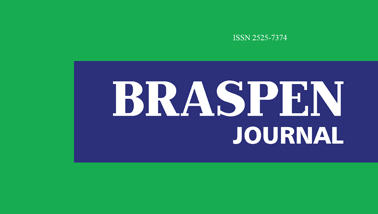Efeito da abreviação do jejum pré-operatório na glicemia e no bem-estar pós-operatório de pacientes submetidos à cirurgia cardiovascular: um estudo clínico randomizado, cego e placebo-controle
Effect of preoperative fasting abbreviation on postoperative blood glucose and well-being of patients submitted to cardiovascular surgery: a randomised, blind, and placebo-controlled clinical trial
Julia Chaves Ayres Bravo, Sabrina Neves Casarotti
Resumo
Introdução: O jejum pré-operatório pode contribuir para a desnutrição e complicações pós-operatórias, uma vez que causa o aumento da resposta metabólica ao trauma cirúrgico de pacientes, tendo como sua principal característica a hiperglicemia. O presente estudo teve como objetivo investigar o efeito da abreviação do jejum pré-operatório na glicemia e no bem-estar pós-operatório de pacientes submetidos à cirurgia cardiovascular. Método: Estudo clínico, randomizado, placebo-controle e cego com 8 participantes submetidos à cirurgia cardiovascular. Os participantes foram aleatoriamente randomizados em dois grupos: grupo tratamento (n=4) e grupo controle (n=4). Os participantes do grupo tratamento receberam água com maltodextrina sem sabor (12,5 g/100 mL) e os participantes do grupo controle receberam somente água, 8 horas antes da cirurgia (400 mL) e de 2 a 3 horas antes da cirurgia (200 mL). Antes da cirurgia, dados demográficos e clínicos e a glicemia em jejum foram analisados. A glicemia foi avaliada durante 24 horas após a cirurgia e o bem-estar dos participantes também foi investigado no pós-operatório. Resultados: Os participantes de ambos os grupos possuíam dois ou mais fatores de risco para o desenvolvimento de doenças cardiovasculares. Os participantes do grupo controle apresentaram maiores valores de glicemia no pós-operatório a partir de 6 horas após a cirurgia e todos eles precisaram de correção com insulina. Entretanto, apenas um participante do grupo tratamento precisou dessa correção. Considerando a avaliação do bem-estar, os participantes do grupo tratamento apresentaram respostas mais positivas relacionadas para a ausência dos sintomas indesejados decorrentes da intervenção cirúrgica. Conclusão: O jejum abreviado resultou em melhor controle glicêmico e conforto dos participantes. A implementação deste protocolo é segura e teve resultados positivos. Ainda assim, são necessários mais estudos para subsidiar esta prática, pois inserir um modelo de jejum abreviado é desafiador em ambientes em que a prática cultural estabelecida é o jejum prolongado.
Palavras-chave
Abstract
Introduction: Preoperative fasting can contribute to malnutrition and postoperative complications, since it causes an increase in the metabolic response to surgical trauma in patients, being hyperglycemia its main characteristic. The present study aimed to investigate the effect of abbreviation of preoperative fasting on blood glucose and postoperative well-being of patients undergoing cardiovascular surgery. Methods: Clinical, randomised, placebo-control and blind study enrolling 8 patients undergoing cardiovascular surgery. Participants were randomly allocated to one of two groups: treatment (n=4) and control (n=4). The participants in the treatment group received water with tasteless maltodextrin (12.5 g/100 mL) and participants in the control group received only water, 8 hours before surgery (400 mL) and from 2 to 3 hours before surgery (200 mL). Before surgery, demographic and clinical data and fasting blood glucose were assessed. Blood glucose was measured during 24 hours after surgery and well-being of the participants was also investigated on the post-operative. Results: Participants in both groups had two or more risk factors for the development of cardiovascular diseases. Participants in the control group had higher postoperative blood glucose values from 6 hours after surgery and all of them needed insulin correction. Conversely, only one participant in the treatment group needed this correction. Considering the assessment of well-being, the participants in the treatment group showed more positive responses related to the absence of unwanted symptoms resulting from the surgical intervention. Conclusion: Shortened fasting resulted in better glycemic control and comfort for the participants. Implementation of this protocol is safe and had positive outcomes. Even so, further studies are required to support this practice, as introduce an abbreviated fasting protocol is challenging in situations where the prolonged fasting is the established cultural practice.

